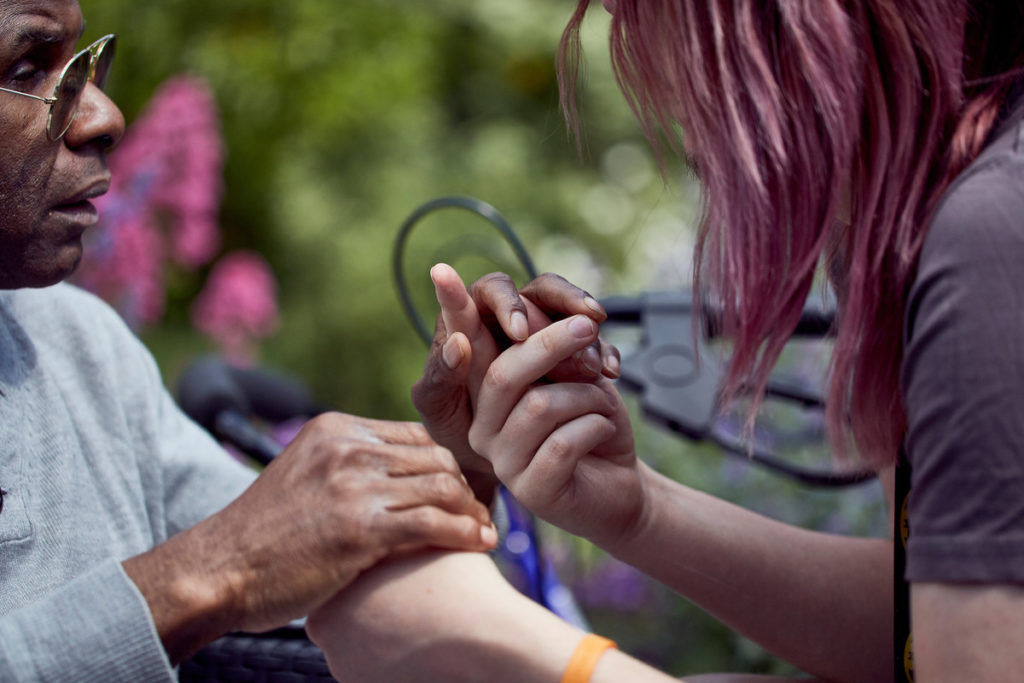What to expect from your council if you’re deafblind
Councils in England and Wales must follow guidance on how to provide services for children and adults who are deafblind.

The deafblind guidance was created to make sure people receive the right support and services from their local authority.
In England, the latest version of the guidance, ‘Care and Support for Deafblind Children and Adults’, was issued in December 2014 by the Department of Health.
In Wales, councils have similar duties.
Sense is here for you at every stage of life
We support people with complex disabilities of all ages.
From our free play sessions for children under eight, to our adult residential care services, we’re with disabled people and their families every step of the way.
Get in touch with our team to find out how we could support you.
Who the deafblind guidance covers
The definition of deafblindness given is:
‘Persons are regarded as deafblind if their combined sight and hearing impairment cause difficulties with communication, access to information and mobility’.
This means you do not have to be completely deaf and blind. Anyone who has both a hearing impairment and a sight loss, which causes them problems in everyday life, is covered by the guidance.
What it means
The deafblind guidance means local authorities should:
- Identify, make contact with and keep a record of people who are deafblind in their area (including those who have multiple disabilities that include visual and hearing impairment).
- Make sure that care and support assessments are carried out by a person or team that is ‘suitably qualified’ – this means they have specific training and expertise related to deafblindness. This is very important to assess communication, one-to-one human contact, social interaction and emotional wellbeing, support with mobility, assistive technology and rehabilitation need.
- Make sure that services are appropriate – they must recognise that as a person who is deafblind, you may not necessarily benefit from mainstream or other services aimed mainly at people who are either deaf or blind.
- Make sure that you can access specifically trained, one-to-one support workers if you need one.
- Provide information and advice in ways that are accessible to you.
- Make sure that a director-level member of the local authority has overall responsibility for deafblind services.
The assessment and who is qualified to carry it out
It doesn’t matter whether you are receiving services already or this is your first assessment, make sure you ask to be assessed in accordance with the deafblind guidance. We have a template to request a care needs assessment.
The assessment will involve you meeting with the person who will be assessing you, usually a social worker, once or on several occasions.
The person assessing you will probably use an assessment form.
You can ask for a copy in a format you can use, such as braille or large print, before the first meeting. This will give you an idea of the sort of questions you may be asked.
The person carrying out your assessment should have had training on the following areas:
- Communication.
- One-to-one human contact.
- Social interaction and emotional well-being.
- Support with mobility.
- Assistive technology.
- Rehabilitation.
- Assessing adults who are deafblind.
Councils must assess any adult who appears to have needs for care and support.
The social services department within your local authority has a duty to provide you with support if you need it and if your needs are eligible needs.
If you are an adult who is deafblind, the person carrying out your social care assessment, must have knowledge of deafblindness to a minimum Qualifications and Credit Framework (QCF) level 3. They should be qualified at a higher QCF level if you have more complex needs.
People with more complex needs are those who were born deafblind, have changing or deteriorating needs, or additional needs, such as dementia or a learning disability.
A person with a Certificate in Deafblind studies has a level 4 qualification, whilst a person with a diploma in Deafblind studies is qualified to level 5.
Assessing children who are deafblind
When children are assessed, this should be carried out by someone who is specifically trained to understand their needs as a child who is deafblind.
The two qualifications which would be relevant to assessing a child are:
- Diploma in Deafblind Studies.
- Education of Learners with Multisensory Impairment (Deafblindness) MEd/BPhil/Postgraduate Diploma/ Postgraduate Certificate/Advanced Certificate.
The services your child is assessed as needing should be provided by people who have the appropriate training and skills.
Getting a copy of the deafblind guidance
Download the deafblind guidance from the GOV.UK website.
Want to speak to an expert?
If you’re deafblind or caring for someone who is, get in touch with our Information and Advice service to find out how we can support you.
This content was last reviewed in April 2023. We’ll review it again next year.
